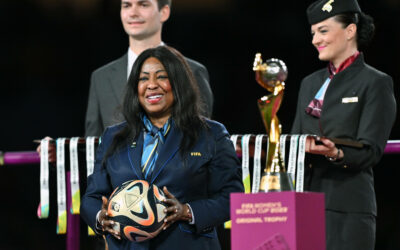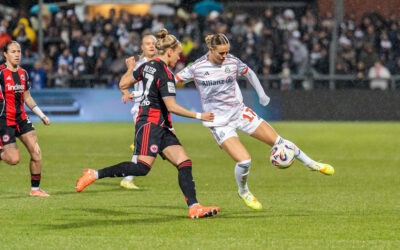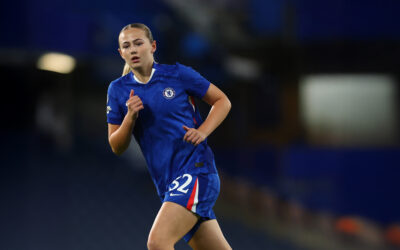Extern
Women-only football clubs have become a rarity in Germany. Many successful clubs such as TSV Siegen, FCR Duisburg and 1. FFC Frankfurt have disappeared from the scene or have been taken over by other clubs. Meanwhile, SGS Essen and Turbine Potsdam have remained in the elite league of German football. How is that possible? An insight into the history and daily work.
Lea Schüller, Linda Dallmann, Marina Hegering and Lena Oberdorf on the one hand, Ariane Hingst, Anja Mittag, Nadine Keßler and Felicitias Rauch on the other. All of these players have one thing in common: they laced up their football boots for SGS Essen or Turbine Potsdam in the past and celebrated great achievements with these clubs, which are women-only football clubs. SGS Essen has been a permanent fixture in the German Bundesliga since the 2004/2005 season. The purple-and-whites have reached the final of the DFB Cup twice and participated in the cup semi-finals four times. On the other side, Turbine Potsdam was part of the first single-tier Bundesliga in 1997/1998 and managed to stay in the league until relegation in the summer of 2023. After a year in the second division, the ‘Turbinen’ returned to the top flight at the start of the current season.
Potsdam is a great example of how the balance of power in German women’s football has shifted and will continue to do so in the future. The two-time European Cup winners, six-time champions and three-time cup winners are currently fighting for sporting survival, currently sitting at the bottom of the Bundesliga table.
Big competition: men’s licence clubs launch their own women’s teams
And the competition in the lower leagues has grown. Numerous licensed clubs from the men’s Bundesliga have set up women’s teams in recent years. It is therefore not surprising that VfL Bochum, Borussia Mönchengladbach, Hamburger SV and VfB Stuttgart are playing for promotion to the first and second divisions. And in the lower leagues of the republic, TSV 1860 München, Borussia Dortmund and Schalke 04 are developing further high-calibre teams starting from the very bottom of the German league system.

Women’s football in Germany is en vogue. Many clubs recognised this ‘trend’ and are investing accordingly in women’s and girl’s football. Are clubs with different approaches like SGS Essen and Turbine Potsdam falling by the wayside? And what role do financial resources play?
Markus Högner, head coach at SGS Essen, sees the current situation as follows: “We are actually the only club in Germany that is in the black. However, we are probably also the club that pays the lowest salaries.”
Nevertheless, Högner believes that Essen is in a good position. After all, the truth is on the pitch. ‘We always have a very, very good team structure, we have an excellent team spirit.’ Högner explains that they have not tried to keep up with Wolfsburg or Bayern, but have been consistently following the Essen way and perfected this approach. This method includes taking unusual paths.
For example, the junior team co-operates with a boarding school that accommodates dance students. For some years now, the junior players have also found a home here. And the number is growing from year to year. The focus on the club’s own youth is furthre reflected in the daily work on the pitch. As some players are still at school, the training schedule has to be adjusted from time to time. Training also takes place twice a week in the mornings and, depending on the weather, the afternoon session sometimes gets postponed so that the younger players who still have to go to school can also take part.
The reward for the hard work: SGS Essen has made a name for themselves in Germany in recent years thanks to the development of numerous international players and established their team in the Bundesliga. The purple-and-whites are also playing a decent season in 2024/2025 and currently sit at a secure mid-table position.

Investments are important: SGS Essen invests in BRICKS and legs
However, SGS Essen are also aware that they need to invest – in bricks and legs. The functional building will be completed in a few months: the players will then have a gym as well as meeting and recreation rooms. In addition, the artificial turf pitches on the training ground will be renewed, all with the aim of improving the conditions for players such as Natasha Kowalski and Annalena Rieke. And more importantly, to convince the players to stay in Essen. With other young talents such as Julie Terlinden, Leonie Köpp, Lany Bäcker and Kassandra Potsi, the next generation is already waiting in the wings. The sporting situation – the team is far removed from the relegation places – gives Markus Högner the chance to introduce the young players to Bundesliga football step by step.
A situation that Turbine Potsdam would love to be in. The promoted team is on the brink of relegation again. The multiple German champions occupy the bottom of the Bundesliga table with just one point. However, the Bundesliga reform from this season, which provides for an increase to 14 teams and only one relegated team, brings hope for the Potsdam team. Carl Zeiss Jena is only a few points away and the direct duel is still to come.
But how did this sporting decline come about in the first place? Dr Karsten Ritter-Lang, President of Turbine Potsdam since November 2022, answered our questions.
Ritter-Lang: Potsdam has stagnated for years
Question: Mr Ritter-Lang, Turbine Potsdam is in last place in the Bundesliga as a promoted team. To put it bluntly, why is that?
Ritter-Lang: There are several levels to consider. First and foremost, there are certainly mistakes in the club’s strategic direction over the last ten years. After the great successes of recent years, we said ‘we’ll carry on as usual’. That was a mistake, because women’s football has developed very dynamically and the club has not kept up with this development.
As a result, there was a clear stagnation in 2021 and 2022, both in sporting terms and in terms of professionalisation, which ultimately meant that the level could no longer be maintained. Then came the 2022/2023 season with relegation. Thankfully, we managed to get straight back up, but at the moment we are not yet as far as we would like to be in sporting terms with the squad.
As far as professionalisation is concerned, we have of course stepped on the gas a great deal in recent years, changed many structures and altered many processes. But we always have the same three problems: money, money and money.
Can you give an example of what you changed in recent years?
We changed the way we look after the professional squad, starting with the acquisition of new players. In the past, players more or less came to us because they wanted to play for us. In some cases, the commitment was made after a video study, which somehow worked. Nowadays, there are more players on offer, so you can’t just watch videos, you have to meet the players in person. So for the past two years, we’ve always had new signings in trial training, we take a close look at the players and also examine them medically.
The second point that we have changed is medical care. We have a higher susceptibility to injury in women’s football and we want to take this into account in terms of prevention. We’re on the right track here, we’ve implemented a lot, we have a network that is woven around the players, so to speak, where they have short distances and are looked after very closely.
The third point is payment, we basically have a team of fully professional players. There are a few exceptions, one player who has a full-time job, but we have now adapted her employment contract with her employer for the first Bundesliga so that it works. Then we have a few players who study on the side. We have players who do a mini-job because their training schedule allows it, which is also good when they get out of the football world and into a company like this. There’s always life after sport, which is also very important to us. And what is of course a big factor for us is this family atmosphere in the club, that we have very flat hierarchies, because of the staffing ratios, players don’t need long to ask a manager about anything.

You said that you missed out on certain things for ten years. Can you even catch up on this development in a very short space of time with so much competition?
It won’t happen in a short space of time, but it is feasible. In addition to the professional squad, we have a youth training centre and a sports school. We currently have 43 girls from year 7 to 12 playing football in the U20, U17 and U15. And what we are now increasingly doing is allowing players from this youth programme to train with the professionals on a selective basis, preparing them for the leap into the professional ranks.
Ten years ago, we had five players every year who made the transition to the professional squad, after one season there were still two left, but they were then regular players. And that has stagnated for three or four years, more or less completely. We currently have three players in the first team, two outfield players and a goalkeeper, who come from the youth programme.
Two more players are waiting in the wings, who also train with us on an ad hoc basis and receive a lot of support. And we are working very hard on this with the youth training centre and the coaches. Since August, we have had a full-time junior coordinator who is responsible for dovetailing the club, school and grassroots sport and who keeps a very close eye on how the scouting courses are organised and how the coaches at the sports school work so that the girls are optimally prepared to switch to competitive sport.
There is still a lot to do, but we are confident that we will be able to develop the next generation of players in this way and then have stable conditions in the team.
Last season in the second division got off to a very slow start and promotion was only achieved at the last minute. With all of Turbine Potsdam’s successes, would you still say that the 2:1 win in Ingolstadt was the most important victory in the club’s history?
It was a hugely important win. It’s like that with a club that’s spoilt for success, when it gets relegated there’s a shitstorm from all sides. Of course, the board of directors gets all of that, but we are Teflon-coated and just let it bounce off.
We focussed on our work and we were fully aware that we wouldn’t be able to save much in the 2022/2023 relegation season because there was too much in tatters. Even the most pious prayers often didn’t help, which is why we had to rebuild the squad in such a way that we could survive in this second Bundesliga. We had a few teething problems, although it was clear that it’s always difficult when a team suddenly starts with twelve new players.
And that was the goal, that we get the team stable and that they develop the spirit and want promotion. And they worked hard to achieve that. In that respect, it was an extremely important victory and an extremely important title. Unfortunately, we weren’t able to take the spirit that was created with us. We don’t really know why.
Our head coach then surprisingly announced his resignation before the start of the season, and then we had to act. We managed to get a change of coach, a different wind is blowing now and the team is stable and working hard. We simply have to reward ourselves now.
FAN GROWTH TAKES TIME: the problem of spectator numbers
How has the fan scene in Potsdam changed? Did the popularity dwindle when the success was gone? Or do you now have even more spectators than in the successful times due to the professionalisation of the league and the increased fan interest?
You have to make a distinction here. Historically, Turbine is actually a fanbase that is completely alien to women’s football. We actually have a 50-plus scene that has been loyal to Turbine for a long time.
What we’re missing now is this regrowth of the fanbase. We’re doing a lot there. Social media, storytelling, certain things to get people excited. We also do a lot in consultation with the team, social commitment. We did a charity campaign at Christmas when we went spinning. All the kilometres ridden were converted into euros by sponsors and donated to a children’s hospice in Berlin. These are issues that we are happy to support. But fan growth takes time, it’s not really dynamic.
You have worked with Hertha BSC in the past. Can you guarantee that Turbine Potsdam will remain independent?
At the end of the day, there is no club that we could merge with, quite pragmatically. We would first need a club to merge with. That’s not in sight. Secondly, you would need the vote of the general meeting, which we won’t get. That’s regulated by our articles of association. And in that respect, we’re not even thinking about it. There is no football club in Potsdam that it would make sense to merge with now. Not at all.
If you could wish for two things for women’s football and for Turbine Potsdam, what would they be?
I actually only have one wish: We need strong sponsors who simply say that we will support you as a women’s football club. And with a five-year perspective. Where they simply say that we have a relevant amount here that we can work with because we are firmly convinced. We are a long way from the men’s departments, a very long way from them. And even a long way from the women’s departments of top clubs like Wolfsburg or Bayern.
the difficult search for sponsorship
What amount are we talking about here?
A lower, single-digit million figure. If we can plan in a stable way and have the money to pay for permanent positions in the office, which we naturally need as part of the professionalisation process, and the players, that’s where most of the money goes. Then we also have the right squad, because the general conditions we have are great. We are the only club in Germany that offers the players a furnished flat when they sign a contract. The players can arrive and have a fully furnished flat with everything inside, washing machine, fridge, microwave, bed, wardrobe, everything. All they have to do is unpack their bag and they’re there.
Surely there should be enough potential sponsors in Brandenburg or Berlin?
If you look at Brandenburg alone, many people always think it’s a flat country with not much going on economically, but that’s not the case. As far as the gross national product per capita is concerned, Brandenburg is in 8th place, which means that the economic power is there. We have a very hard currency, that is our social reach. And it’s growing at a gigantic rate – we get the figures from the DFB every autumn, showing how social media and media reach has changed from season to season. And that’s the currency we trade in.
Text: Florian Rümmele



